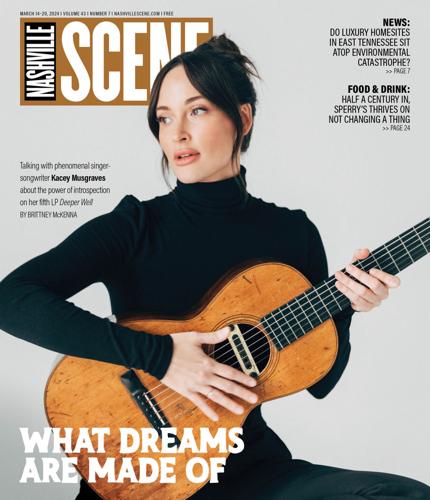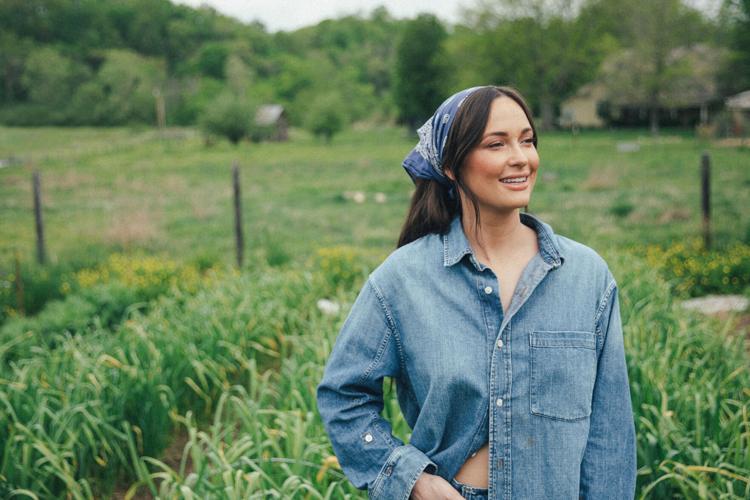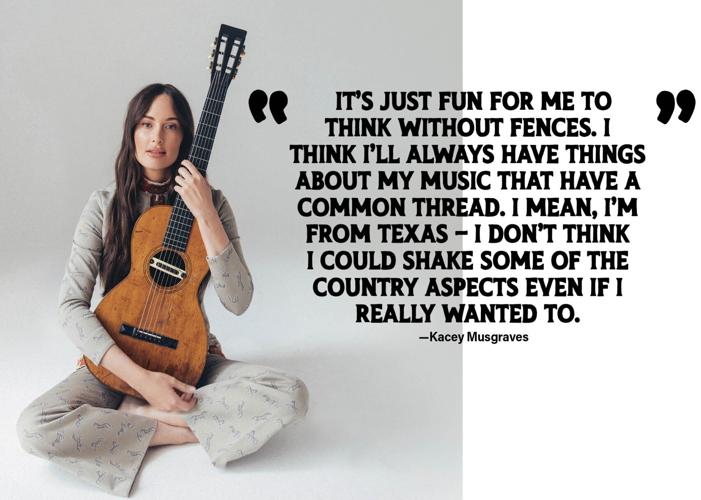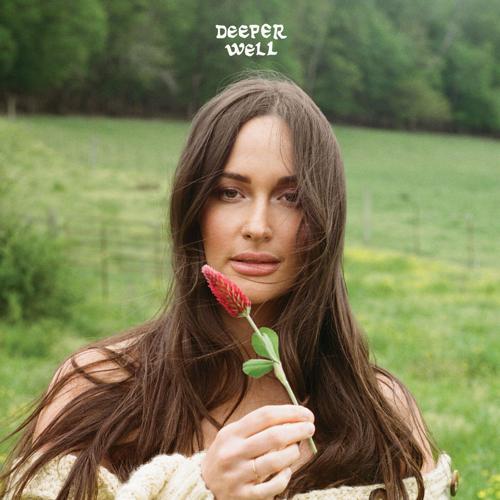Kacey Musgraves found her flow.
Metaphysically, that is. The seven-time Grammy winner has been in an artistic groove for more than a decade now, gradually expanding the country genre since releasing her debut single, “Merry Go ’Round,” in 2013. But life doesn’t care about your trophies, and Musgraves went on a journey of self-discovery when hers began to feel difficult.
The result of that journey is her fifth album Deeper Well, out Friday. The record is Musgraves’ most assured yet, despite also being her quietest. After 2021’s Star-Crossed, an ambitious album that chronicled her divorce while also playing with genre, Musgraves tuned out the noise and followed her gut.
“I went into this album with no preconceived, hard ideas for songs,” Musgraves tells the Scene, catching up before boarding a flight to New York City to perform on Saturday Night Live alongside host Sydney Sweeney. “I didn’t really even have a timeline. … I knew that I wanted to make a record that was a little softer than Star-Crossed, but other than that I was really open to whatever presented itself.”
What wound up presenting itself is a gentle but potent LP, recorded at New York City’s famed Electric Lady Studios, once home away from home for Jimi Hendrix. As on 2021’s Star-Crossed and 2018’s Golden Hour, Musgraves tapped co-producers Ian Fitchuk and Daniel Tashian to join her for the project, with the trio landing on a sound Tashian calls “future folk.” Thematically, Deeper Well digs into spirituality, healing, death and our inherent interconnectedness, both with one another and with the natural world.
In a world growing louder by the day, Musgraves engages these concepts with a light touch, nestling her insights in lush and verdant production. Lyrically, the record finds spaciousness within simplicity, each idea distilled to its very essence.
“The world is really so chaotic, and it’s nice to have a soft place to come back to that feels soothing,” Musgraves says. “I seek that out in a lot of ways, with either music or meditation or self-care.”
As they did with Star-Crossed, genre obsessives will likely argue over Deeper Well’s country bona fides, a tedious debate that belittles the expansiveness and ambition of both projects. In 2021, a mini controversy erupted online when The Recording Academy deemed Star-Crossed ineligible for country categories on the 2022 Grammy ballot.
The decision felt both arbitrary and targeted. Though Star-Crossed dips into pop (“Breadwinner” is still a banger), songs like “Justified” and “Keep Lookin’ Up” sound more “country” than most songs on Billboard’s Hot Country Songs chart, now or then. Plus, there’s more to country music than a steel guitar.
“Star-Crossed, I believe, was a very adventurous country album,” Tashian tells the Scene. “Personally, I felt like, ‘This is the country music of the future.’ People said, ‘Now, you can’t call it that because it doesn’t have fiddles on it,’ or it doesn’t ‘this’ or it doesn’t ‘that,’ and that’s fine. I understand all that. … But I think everything Kacey does has a kernel of the nucleus of country to it, because it’s what she is. She’s from a small town in Texas. She thinks country thoughts. She sings in a country way.”
Musgraves has long defied tidy categorization, though, and seems to grow more genre-agnostic with each record. She’s more interested in how genres can collide than how they differ from one another.
“It’s just fun for me to think without fences,” says Musgraves. “I think I’ll always have things about my music that have a common thread. I mean, I’m from Texas — I don’t think I could shake some of the country aspects even if I really wanted to. But it’s really fun to have total creative freedom to make whatever feels good. I think some of the best artists of all time were genreless. If you really think about it, what were The Beatles? I don’t know. They were kind of all things.”
To borrow a phrase from Cody Chesnutt, Deeper Well is a headphone masterpiece. Where Star-Crossed was widescreen and cinematic — it had an accompanying film, after all — Deeper Well is best experienced through your nicest speakers. Its meticulously detailed production is not just gorgeous and complex but often integral to Musgraves’ storytelling. Negative space permeates the record. Near the beginning of the title track, Musgraves sings, “When I turned 27, everything started to change,” in a spot where you expect a rhyming couplet to follow; instead, there’s a quick chord change that’s arpeggiated on multiple acoustic guitars.
That song is the record’s thesis statement, a succinct and relatable accounting of things that no longer serve Musgraves: an ex with “dark energy,” a homemade gravity bong, baggage from growing up in a small town. There’s no ill will here, though, just acknowledgment and release — like we’re privy to her passing thoughts while meditating.
Later in “Deeper Well,” Musgraves admits, “The things I was taught only took me so far / Had to figure the rest out myself.” Asked how she found her way on her own, she answers: “First of all, surrounding myself with people that are truth-tellers, that are honest. I’m lucky to have a really amazing friend group that I made almost 15 years ago, so we totally trust each other. A good therapist, for sure. And just paying attention along the way — tuning in, trying not to ignore those laws of nature, those things that are feeling wrong.”

Musgraves perks up when the conversation turns to nature, a core source of inspiration that snakes its way through the LP. Opening track “Cardinal” tunes into the symbolism of the everyday, as the appearance of a “scarlet red” cardinal while out on a walk hints at “message[s] from the other side.” “Heart of the Woods” likens the network of mycelia beneath the forest floor to a “neighborhood that can’t be seen,” where trees and plants communicate and “look out for each other” through their roots. Unsurprisingly, Musgraves is a noted fan of the mycologist Paul Stamets.
“I have such a massive reverence and love for nature,” she says. “For me, I would say nature is God, even though a lot of people have different meanings for that word. I heard a quote the other day that I really loved a lot, and it said, ‘The ultimate rich is being in tune with the flow of nature’ — like, being able to pay attention to what nature is telling you.”
Another song drawn from nature is “Sway,” a lush and layered plea for resilience. The track builds slowly to a gorgeous chorus of vocals — performed mostly by Musgraves, though Tashian pitches in, and the inimitable Sarah Buxton joins too. It’s a neat bit of sonic storytelling, as the chorus swells like a passing breeze.
“If you’re in the wrong relationships, or you’re choosing the wrong things, or you’re around the wrong people, or maybe you’re in the wrong job,” Musgraves says, “nature is going to quietly tell you and quietly tell you, and keep whispering and whispering until it’s literally screaming at you to make changes.”
The kind of intentional attention that allows nature’s voice to ring clear is also central to Deeper Well. The slinky standout “Lonely Millionaire,” which interpolates JID’s “Kody Blu 31,” reminds us that the aspirational luxury of a “gold watch” or a “black car” only distracts from what actually makes life meaningful. The dusky “Giver / Taker” opens with the line, “Sundown and I’m lonely in this house,” a motif that recurs throughout the record.
So, too, does a spirit of vulnerable generosity. In “Giver / Taker,” Musgraves sings: “I’d give you everything that you wanted / And I would never ask for any of it back.” In the first verse of “Lonely Millionaire,” she tells a lover: “When I get paid I wanna spend it on you / Baby, that’s what it’s for / I’d burn it all to keep you warm.” Even the melancholy “Moving Out,” ostensibly about the end of a relationship, expresses a hope to leave a place “better than we found it.”
“Kacey has always been good at writing a wide variety of topics, not just whatever romantic relationship she’s involved with,” Fitchuk says. “I’d like to think it brought out some topics like ‘Dinner With Friends’ or ‘Lonely Millionaire,’ or even ‘Deeper Well,’ for that matter, which weren’t necessarily tied to the beginning or ending of a specific relationship.”
The beating heart of Deeper Well is “The Architect,” a Shane McAnally co-write that ponders the intentions — and existence — of a higher power. It’s one of the best songs Musgraves has ever written, neatly encapsulating her ability to distill heady concepts into simple images and to create space by zooming in — a rare skill she shares with one of her foremost inspirations, the late John Prine.
Starting with “something as small as an apple,” Musgraves wonders if the world around us was “thought out at all or just paint on a wall” before questioning her own free will (“Am I shapeable clay / Or is this as good as it gets?”) and acknowledging the mystery and “happenstance” of human connection. She offers no easy answers. Instead, she flips the chorus refrain — “Can I speak to the architect?” becomes “Is there an architect?” in the song’s final seconds.
Musgraves and McAnally wrote “The Architect” in the weeks following the March 2023 Covenant School shooting, which claimed the lives of three students and three staff members in Nashville. Songwriter Josh Osborne was at the session that day too. Musgraves says the three of them “sat and talked for quite a long time before even diving in to write something.”
“It felt so close to home,” she says of the shooting. “It was just so hard to know how to continue how to function after that, especially sitting down to write a song — something that should be joyful. It just felt dumb to be sitting there doing something like that when a truly life-changing, terrible event had just happened in our town.”
The conversation brought to mind a title — “The Architect” — that Musgraves had been mulling over, connecting it to their broader bewilderment at trying to make a life while it feels like the world is falling apart.
“If you say a song title in a room with Josh and Shane, it’s gonna get written,” she says. “Josh said, ‘Yeah, you know, what’s going on here? Can I speak to the architect? Is there a blueprint for any of this?’ It really was born out of organic conversation about things that were happening in the world.”
It’s cliché to liken New York City to a character in a piece of art, but that overused idea wouldn’t apply easily to Deeper Well anyway. While some artists’ New York eras romanticize bright lights and big dreams, Musgraves celebrates the city’s uncanny ability to spark introspection, doing so not by calling it out explicitly but by sharing the insights she gleaned while commuting to the studio, or during breaks at nearby Washington Square Park, which she calls “a great equalizer, where people from all walks of life are hanging out together, in the same space.”
“New York is relatively a small place, geographically speaking,” she says. “But there are multitudes of humanity stacked on top of each other in one small area, and there’s something to that, I think. Personalities, eccentricities, emotions are all heightened in that sort of environment, so it’s a really inspiring place to create. You walk down the street, even just 30 seconds, and you’re encountering so many different languages and personalities, and thoughts and colors.”
“For a person that tends to skew towards the ADHD direction of things, which I think both Kacey and I tend to,” says Tashian, echoing her sentiment, “a little bit of hustle and bustle around you is good for creativity.”
There are subtle, NYC-inspired flourishes throughout the record. A bass line in “Deeper Well” recalls Lou Reed’s “Walk on the Wild Side,” a fantastical document of some of the bolder personalities once in the orbit of Andy Warhol and his Factory.
Fitchuk says he’s especially drawn to “Heaven Is,” a gentle, image-rich catalog of the simple pleasures that make life worth living, like “a lavender rose” and “the light” in a loved one’s eyes. The final verse opens with the line, “Nobody knows where we go when we die,” an admission that underscores the fragility and preciousness of our most meaningful human experiences.
The trio wrote “Heaven Is” after a night out at an Irish bar, where the house band played “Ca’ the Yowes,” a pastoral love poem attributed to Scottish poet Robert Burns that’s been set to music and sung for centuries. They worked part of the traditional melody into “Heaven Is,” imbuing the intimate lyric with a sense of old-world timelessness. They even considered adding bagpipes — Fitchuk’s mother is a piper — but chose a simpler route instead, letting the sounds of the city bleed into Tashian’s acoustic guitar.
“We recorded it on the rooftop, her vocal and the acoustic guitar,” Fitchuk says. “She was just sitting on the rooftop of Electric Lady, and we kept that recording. … That was such a memorable recording experience.”
Folk music has a long history of drawing from the traditional songbook; if it can be categorized, Deeper Well is a folk album. Tashian cites ’90s luminaries like Shawn Colvin, Suzanne Vega and John Gorka as his personal New York folk touchpoints. Meanwhile, Musgraves points to the Greenwich Village scene of the mid-20th century, and Fitchuk namechecks Simon & Garfunkel.
There’s also folk’s blurring of the personal and the political, something Musgraves does on “The Architect” as well as another album highlight, “Dinner With Friends.” The song enumerates things she’ll miss “from the other side,” and she modeled the piece after two famous lists that conclude Nora Ephron’s final essay collection I Remember Nothing from 2010. The New York writer and filmmaker wrote down the things she would and wouldn’t miss after her life was over while quietly battling the aggressive leukemia that would end her life in 2012.
Tucked into images of lively gatherings and peaceful quietude, Musgraves says she’ll miss some things about her home state of Texas: “The sky there / The horses and dogs / But none of their laws.” Like her invitation to “Kiss lots of boys / Or kiss lots of girls / If that’s something you’re into” on her breakout 2013 hit “Follow Your Arrow,” that Texas callout fits seamlessly into the rest of the song. It’s subtle enough that you might miss it, antithetical to the trend of using one’s beliefs as a marketing tactic. She isn’t performing her politics; she embodies them.
Musgraves will embark on an international tour in support of Deeper Well at the end of April, kicking things off in Dublin and wrapping with a two-night homecoming at Bridgestone Arena in December. She says she’s excited to bring the visual elements of the new record to life, as her songwriting process also involves figuring out what a song might look like.
“I love bringing the songs to life in a visual sense,” she says. “The second I start writing a song, I’m already thinking about the video. I’m thinking of the world that it’s creating. And touring is no different.”
Musgraves admits that touring life is difficult, but that a live performance also enables the higher, more spiritual kind of communion that’s at the heart of Deeper Well.
“It’s a really beautiful way to connect with other people who feel the same thing that you felt, that made you write the songs,” she says. “And I’m really grateful for the opportunity to do that.”

Kacey Musgraves




